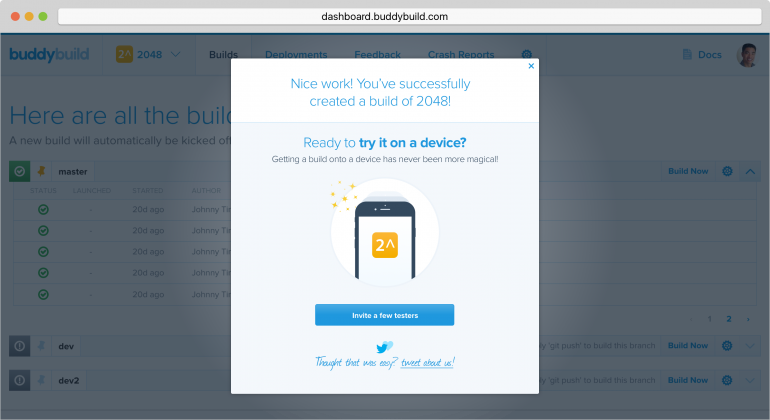The workflow for launching an app is pretty much broken. Between building it, testing, deploying, and adapting to feedback from actual users, the process could be a hard slog, even for a tech giant like Amazon or Microsoft. However, Vancouver-based Buddybuild has a solution that makes it easier for app builders to innovate faster and cheaper than ever – and they’ve just announced a Series A round of $7.6 million in financing to fuel rapid growth for their slick solution.
“The space is so ripe for innovation,” said Mike Abbott, partner at Kleiner Perkins Caufield and Byers, which led the investment for the round. “It’s clear that mobile is where we do most of our computing, but existing solutions in this space are an inhibitor to a team’s desire to iterate quickly. Today, teams resign themselves to retrofitting legacy web infrastructure which wasn’t designed to meet the unique requirements of building a mobile app.”
Buddybuild first launched in October 2015, and the demand for the solution was apparent back then, with an oversubscribed funding round of $1.2 million garnered in less than 24 hours. Much of that early enthusiasm from investors came from trust in Dennis Pilarinos, the founder and CEO, who had earned his stripes as a high level program manager developing popular products for Amazon and Microsoft. When his team was developing Amazon’s Fire Phone, he was meeting regularly with Amazon founder Jeff Bezos.
“We’re wired to humility because we don’t want to breed ego, where we think we’re untouchable or unstoppable.”
Though he’d worked with some of the biggest enterprises around, Pilarinos dreamed of being an entrepreneur since his days at Simon Fraser University – and when the idea for Buddybuild came up, it seemed like the right time. He’d seen from the inside how the process of mobile app development wasn’t efficient – and realized, after doing some research, that app development on competing systems wasn’t any better.
“Everyone suffers from the same problem,” he said. “Ultimately, your ability to engage your end users is the degree to which the app will be successful.” Buddybuild takes advantage of a cloud backend and an easy-to-use interface that gives developers instant feedback that’s more useful than what was previously available via email, such as highlighted screenshots of apps being used and ‘instant reply’ reports that can show a video log of what the user was doing up to fifteen seconds before the app crashed.
Creating that functionality and putting it out to the marketplace with a startup was a bit of a risk for a technology professional who had spent all of his working years in-house, Pilarinos acknowledged. “The position of the company when we started was just that we had a hypothesis and we wanted to experiment. We weren’t even sure we were building software people would like or use. That’s an uncomfortable position to be in. You’re putting in 60 to 80 hour weeks on things people might never see. This, on top of walking away from an Amazon position – that psychological position of building a company from scratch, dwarfs the second hardest thing you’ll ever do.”
That experiment paid off — they’ve already got over 2,000 companies using Buddybuild and the feedback has been extraordinary. Whistle Labs senior iOS engineer Scott Bates, for instance, calls Buddybuild “without question, the best mobile focused build tool available. The suite of features surrounding it, like their beta user feedback tool, Jira integration, crash logs that show you the actual code in context, and even prebuilding against new XCode releases make the decision to use BuddyBuild an easy one that I recommend every developer should make.”
Nonetheless, Pilarinos is remarkably humble about what they’ve achieved thus far – and attempts to instill that sense of humility in his team of 16 as they move forward. “We’re wired to humility because we don’t want to breed ego, where we think we’re untouchable or unstoppable. We’re focused on improving.” He suggests that if you have one out of 50 users that’s complaining on social media, you need to make it a priority to fix their problem, reach out to them, and hopefully make their experience more positive.
This is also a made-in-Vancouver success story – essentially because Pilarinos insisted on that as a condition of funding. “I have a passion to build this right here in Canada,” he said, resisting the usual pressures to relocate to Silicon Valley that local startups often see once venture capital gets involved. They’re now a part of Vancouver’s fast-growing tech hub – building relationships with other local companies to help foster that local community.


